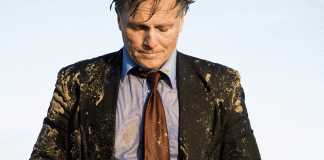The hope of God’s judgement
To be able to see our world and life through the experiences of someone of a different culture and background is rare. It is a gift—but it can also be a jolt to our sensibilities and assumptions. The world we thought we knew can look very different through someone else’s eyes. This is one reason storytelling can be such a powerful form of...
People get ready
The song, “People Get Ready” was inspired by Martin Luther King Jr’s march on Washington and his “I have a dream” speech. In writing it the following year (1964), Curtis Mayfield not only captured the spirit of the march but created a song that caught the mood of the times and injected hope: “There’s a train a-comin’… . You don’t need no ticket,...
Why forgive? | The “justice” you don’t put to death won’t let you live
Following a poll, the Gallup Organization revealed good news and bad news. The good news is that 94% of the population believes that it is very important to forgive. The bad news is that 85% admit that, in their own power, they are not ready to forgive.
The God of all | The divine vision on our differences
The first part of my life was marked by multiple barriers that placed me in a minority status.
The future is best seen with your eyes closed
When I watch chicks hatch in a nest and begin to perform the instinctive behaviours of their species, I think about what we might understand about ourselves, the human species, if we had the perspective of such a privileged observer.
What did I miss about God in my 20s?
I was twenty when I first became curious about God. I was fortunate to see His presence in the lives of my friends and longed for that same presence in my own life.
The end of the world, according to Jesus’ teaching
Much has been written about the end of the world, but, if this end coincides with Christ’s second coming, then we should enquire from Jesus Himself what he teaches about His return. We will do this by using the material of the Christian Gospels.
Jesus and the Goddess of Reason | Thomas Paine and the trap of contemporary deism
"I believe in one God, and no more; and I hope for happiness beyond this life." This is how one of the most famous leaders of the American Revolution and an influential political writer of the late 18th century-Thomas Paine (1737-1809)-begins his testimony of faith. A few lines later in the same book, The Age of Reason, after vehemently rejecting the creed of...
Depression also affects Christians
The stigma surrounding mental health issues causes many Christians to hide their conditions, resulting in an epidemic of depression, even among pastors, says Sheila Walsh, a Bible professor and internationally renowned speaker.
The year 1989 and three decades later
The year 1989 changed not only the countries of the former communist bloc but also the world. From a geopolitical, economic, cultural, and religious standpoint, 1989 was a watershed year that changed the meaning of international relations, with direct effects on all areas of life.
Burma to Brisbane: Esther Moo’s story
Let me paint you a picture of Esther Moo’s life, one of approximately 1959 Karen refugees who migrated to Australia between 2009 and 2010.
Why our neighbour is the key to understanding God
I have always been fascinated by God. And yet, I believe I could have known Him far better—much more deeply—if only I had better understood what He sought to teach me each day, including through my neighbour.
Science has proven that God doesn’t exist. True or false?
Marquis Pierre-Simon Laplace (1749-1827), a mathematician and astronomer and one of history’s most influential scientists, once had a meeting with Napoleon Bonaparte. Laplace came to offer the first consul of the republic a copy of his book, “Traité de mécanique celeste” (Treatise on Celestial Mechanics)—an analysis of the solar system that expanded on Isaac Newton’s conclusions.
The happiest people in the pandemic
“How can we rejoice if we’re at war?” This was one of the questions that arose in my mind after reading a book comprised of testimonies of people who experienced World War II as children. Decades after this nightmare, and stricken by a crisis that casts its shadow over people and nations everywhere, the question remains: can we still be happy in times...
Under the shadow of the pandemic: was 2020 really the worst year in history?
Peering through the dust settling from the chaos of last year, we are trying to see into the unknown of the coming year, hoping for the best. Irrespective of what our hopes for 2020 were, our expectations for 2021 seem to centre on things going back to normal.


























